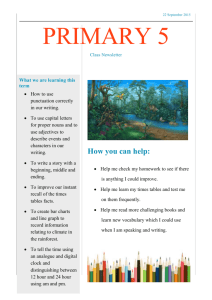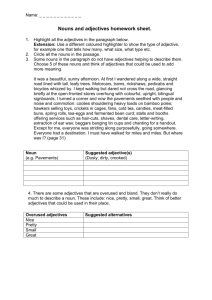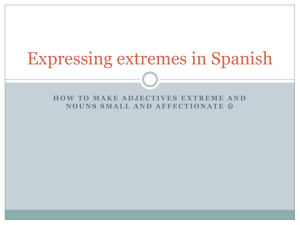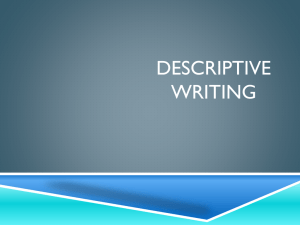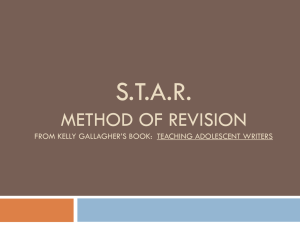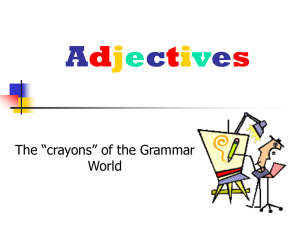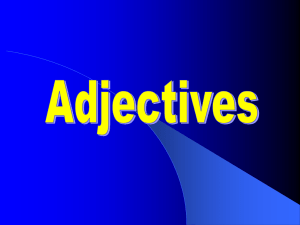eprint_12_31923_748
advertisement
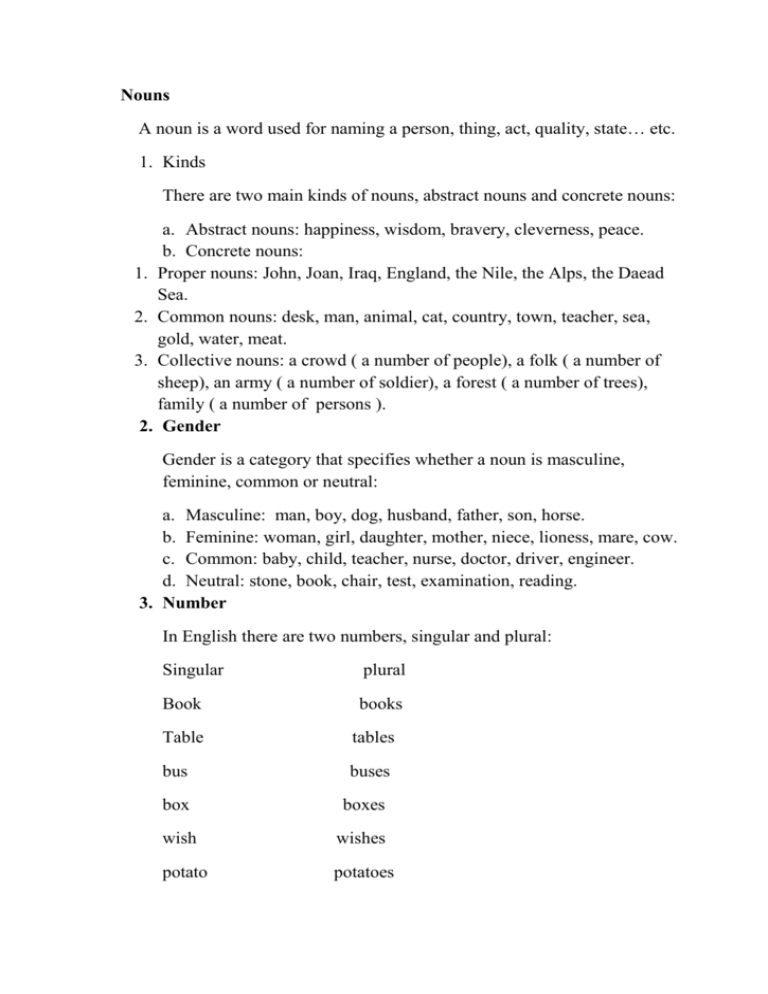
Nouns A noun is a word used for naming a person, thing, act, quality, state… etc. 1. Kinds There are two main kinds of nouns, abstract nouns and concrete nouns: a. Abstract nouns: happiness, wisdom, bravery, cleverness, peace. b. Concrete nouns: 1. Proper nouns: John, Joan, Iraq, England, the Nile, the Alps, the Daead Sea. 2. Common nouns: desk, man, animal, cat, country, town, teacher, sea, gold, water, meat. 3. Collective nouns: a crowd ( a number of people), a folk ( a number of sheep), an army ( a number of soldier), a forest ( a number of trees), family ( a number of persons ). 2. Gender Gender is a category that specifies whether a noun is masculine, feminine, common or neutral: a. Masculine: man, boy, dog, husband, father, son, horse. b. Feminine: woman, girl, daughter, mother, niece, lioness, mare, cow. c. Common: baby, child, teacher, nurse, doctor, driver, engineer. d. Neutral: stone, book, chair, test, examination, reading. 3. Number In English there are two numbers, singular and plural: Singular plural Book books Table tables bus buses box boxes wish wishes potato potatoes piano pianos library libraries fly flies boy boys day days leaf leaves roof roofs chief chiefs thief thieves child children datum data basis bases medium media man men woman women mouse mice tooth teeth foot feet Adjectives An adjective is a word used to describe a noun. This can be illustrated in the following examples: They live in a quiet house. It’s a warm evening. The food is delicious. He is feeling romantic. There are two places where we can use adjectives: a. Before nouns as in : a quiet house. b. After a linking verb as in : He is feeling romantic. Adjectives before nouns Adjectives after linking verbs He has got a new car. Ali's car is new. It was a dark night. It was getting dark. This is good coffee. This coffee tastes good. Linking verbs are : appear, become, feel, get, look, seem, smell, taste. Two adjectives can be used before a noun: It's a quiet little house. He was wearing a dirty old coat. Words such as very or quite can be used before adjectives : It was a very dark night. He was feeling quite romantic. Adjectives used only before nouns: He is crossing the main road. The only problem is I've got no money. Chess is an indoor game. Adjectives used only after linking verbs: The baby is asleep. His brothers are very alike. I'm pleased to see you. He looked ill. Other adjectives are ( afraid, alone, ashamed, awake, alive, glad, well. Exercise: Identify adjectives in the following paragraph: This comfortable hotel with its pleasant gardens is ideal for people who want a quiet holiday, yet it is only a short distance from the highly popular attractions of the area. There are lovely views from every room. The atmosphere is very friendly, and the staff are always helpful. A holiday here is very good value for money. Your sister / elder : Your elder saister The boy /asleep : The boy is asleep. My desire /chief : My chief desire. My heart /content: My heart is content . The thing to remember / main: The main thing to remember. The night / alive: The night is alive. Secrets /inner: Inner secrets. The girl for me /only: The only girl bfor me. The order of adjectives We can use more than one adjective before a noun: It's a beautiful sunny weather. He has got a big black dog. Adjectives and nouns We can use two nouns together: a glass door. A computer program. An adjective can precede these two nouns: a heavy glass door. A useful computer program. Adjectives can be ordered according to their meanings: 1. 2. 3. 4. 5. 6. 7. Opinion: wonderful, nice, great, awful, terrible. Size: large, small, long, short, tall. Quality: quiet, famous, important, soft, wet, difficult, fast, angry, warm. Age: new, old. Colour: red, blue, green, black. Origin: American, British, French, Iraqi Material: plastic, stone, steel, paper. 8. Type: an electric kettle, political matters, road transport. 9. Purpose: a bread knife, a bath towel. Consider the following examples: A small green insect ( sioze, colour ) A wonderful new face ( opinion, age, purpose ) A long boriong train journey ( size, quality, type ) Japanese industrial designers ( origin, type ) Awful plastic sovrenirs ( opinion, material) Some nice easy quiz questions ( opinion, quality, purpose ) Exercise : put the following adjectives in correct order. 1. 2. 3. 4. 5. 6. Basin, sugar, antique, silver: an antique silver sugar basin. Vase, glass, old, lovely: a lovely old glass vase. Mirror, wall, attractive: an attractive wall mirror. Desk, modern, office: a modern office desk. Boat, model, splendid, old: a splendid old model boat. Stamps, postage, valuable, Australian: valuable Australian postage stamps. 7. Table, small, coffee, woden: a small woden coffee table. The old, the rich, etc. There are some adjectives that we can use with the to talk about groups of people in society as illustrated in the following examples: The rich can help the poor. The young are keen to travel. It is our duty to care for the sick. The young means ''young people in general''. When we mean a special person , we use man or woman : There was a young man standing on the corner. I know the young man in reception. Interesting and interested The book is full of information. It's very interesting. Mike is very interested in the book. Consider the following examples with – ing and – ed: -ing -ed Tom told us an amusing story. We were amused at Tom's story. The party was boring. I felt bored. The computer has some confusing instructions. The game was exciting. I got very confused. The united fans were excited. The weather is depressing. The weather makes me depressed. The test results were surprising. I was surprised at the test results. Comparative and superlative forms The comparative and superlative forms of one syllable adjectives can be made by adding – er and – est as in : She needs a bigger computer. This is the nicest colour. We use more and most before words ending in – ed. Every one was pleased at the results, but John was the most pleased. More and most are used with three – syllable adjectives: The film was more exciting than the book. The dress was more elegant. We did the most interesting project. This machine is the most reliable. Some two – syllable adjectives have er, est, and some have more, most: Two – syllable adjectives: 1. Words ending in a consonant + y have er, est, eg happy, happier, happiest. Examples are: busy, dirty, easy, funny, heavy, lovely, lucky, pretty, silly, tidy. 2. Some woprds have er, est OR more, most, e.g. narrow, narrower, narrowest OR more narrow, most narrow . Examples are: clever, common, cruel, gentle, pleasant, polite, quiet, simple, stupid, tired. 3. The following words have more, most, e.g. useful, more u7seful, most useful. a. Words ending in ful or less, e.g. careful, helpful, useful, hopeless. b. Words ending ing or ed, e.g. boring, willing, annoyed, surprised. c. Many others, e.g. afraid, certain, correct, eager, exact, famous, foolish, frequent, modern, nervous, normal, recent.
